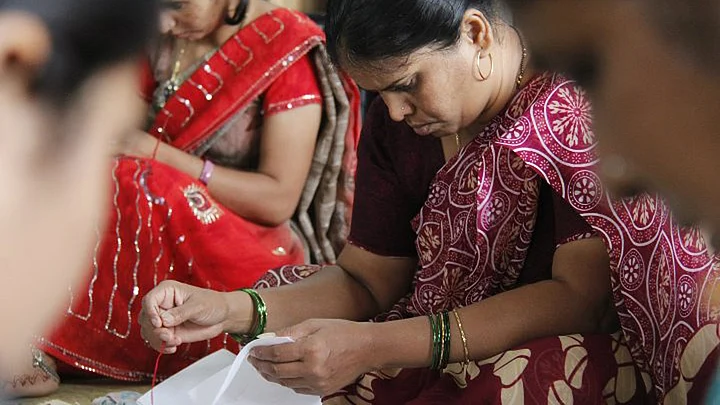On a balmy Saturday evening in March, I made my way across a suburban slum in Mumbai with Arul Mary, my translator and a social worker. We were in pursuit of stories – stories of women who’ve faced physical and mental abuse in their lives.
Raveena, 42, the first woman who agreed to talk to us wasn’t at home when we reached. Her door had garlands strung across it; and it was next to a steep flight of stairs. She found us quickly and welcomed us into her home. She lost her husband last month after he suffered serious injuries in a road accident. He hit her repeatedly in their marriage spanning several decades – always in alcohol-fuelled rage.
She often tried to escape to her native place in Tamil Nadu – her parents’ home and her refuge – with her children.
However, he’d always cajole her into returning, insisting that he would change – that he was sorry.
“Bacche log barbaad ho jayeenge” (My children will be devastated) – was how Raveena would always reason with herself, as she made her way back.
How SNEHA Reaches Out to Domestic Abuse Survivors
Another woman from the same area – Reshma, 29 – has a husband who is bedridden due to alcoholism. She holds down two day jobs – one as a garbage collector and the second at a food stall in the slum, doling out delicious pieces of chicken to hungry customers.
Reshma smiles easily, her jewellery gleaming in the evening light as she works, her wallet tucked safely inside the pleats of her orange saree.
Reshma’s husband still drinks when he’s not bedridden. Her past is clouded with memories of her husband beating her, over and over and over, in drunken hazes. She would run away – only to be found by him again and be subjected to the torture.
The Mahila Mandal that Mary is a part of is a group that tries to reach out to women subjected to any kind of abuse in the area, offering counselling and a shoulder to cry on. Mary believes that the women find it easy to talk to them because they finally feel understood. “Vishwas karke bolte.” (They share because they trust us).
90 Feet Road in Mumbai’s Dharavi slum area houses a community centre where women gather to talk, offering a helping a hand to victims of domestic abuse. City-based NGO SNEHA (Society for Nutrition, Education and Health Action) works on eradicating domestic abuse in impoverished parts of the city while tackling a rusty, creaky system that is indifferent to victims of abuse.
The NGO workers also talk to doctors in government hospitals such as Nair and KEM and local police officers, sensitising them to victims of domestic violence.
“Kaun Sa Haq Se Haath Uthata?”
According to Pouruchisti Wadia, 49, associate programme director at SNEHA, the root cause of gender-based violence in homes is the traditional patriarchal structure in India. “They think it’s normal,” she said, referring to women trying to justify the regular occurrences of brutal violence in their homes.
36-year-old Latika came to SNEHA’s community centre to share her story with me, her striking red bindi and smile in place. The centre is a small room with a couple of chairs, a mattress, a few knick-knacks and posters on the wall. One of the posters had lines from the 2013 campaign, MARD (Men against Rape and Discrimination), which was launched by Bollywood actor Farhan Akhtar.
Latika lives with her family in a constant state of flux. Her husband has had several extra-marital affairs and has lashed out at Latika whenever she protests – using physical violence to dominate her.
She started selling utensils to support her family at the age of 13 and got married at 22. An extended family member assaulted her once, giving her a gigantic bruise on the left side of her face. Post joining SNEHA, Latika says she’s finally finding the strength to stand up for herself. “Kaun sa haq se haath uthata?” (What right does he have to hit me?)
Suhana, 30, who suffered domestic abuse from her in-laws, has been similarly emboldened by SNEHA. She recognises her basic human rights and remembers the law – knowing they cannot intimidate her. Suhana has also started helping others in need – single, pregnant women, rape victims, other victims of domestic abuse.
As I left the centre, Suhana, Latika and her children and a few others settled down comfortably to talk and laugh. I left with happy chatter behind me, a reminder that there is light even in the darkest of places.
(All the names of the victims have been changed on request.)
(Boshika Gupta is a journalist from Bombay who’s interested in writing about minority issues. Find her on Twitter @Smilingblues)
(At The Quint, we question everything. Play an active role in shaping our journalism by becoming a member today.)
